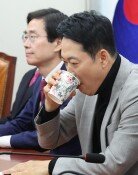Chinese Businessmen Enter Politics for the First Time
Chinese Businessmen Enter Politics for the First Time
Posted January. 22, 2003 22:55,
▽Businessmen Enter Politics
Chinese Shinhwa Agency reported on Jan. 22 that Shui Gwan zui, chairman of Chuanhwa Group and In Ming San, chairman of Lipan Group were respectively appointed as vice president of a political council in Zhejiang Province and Chongqing City.
The news agency pointed to that this is the first that businessmen from the private sector were named high-ranking officials on the provincial level.
Their break into the politics came as president Jiang Zemin introduced the `three representative` theory in the communist party`s 16th National Congress last year, allowing capitalists to join the party, a move aimed to expand the support base for the communist party.
Shui was qualified for the job as chairman of the merchant association in Zhejiang Province, and In as chairman of the merchant association in Chongqing.
˝Chairman Shu began investing in chemical and high-tech agricultural business 10 year ago with bank loans worth some 2,000 yuan (300,000 won), and now his business has a capitalization of 1.25 billion yuan (187.5 billion won),˝ noted Shinhwa Agency. ˝He formed a communist party within Chuanhwa Group three years ago, paving the way for forming private business-level parties.˝
▽Shenzhen Pushes for Political Reform
The Beijing Youth Daily reported on Jan. 21 quoting Mayor of Shenzhen City Wui Yu Zuin, ˝Shenzhen will introduce a three branch system comprising legislative, executive and supervisory bodies within the first half of this year.˝
The reform, a revised form of the checks and balance system of legislative, administrative and judiciary branches, will put a priority on the administrative part before legislative and judiciary functions, which is similar to the government in Hong Kong.
The Chinese government plans to further introduce the system to major cities throughout the country depending on the result of the early reform.
Earlier in November last year after the 16th National Congress, the communist government established a think tank in its school for high-ranking officials to push for political reforms on the government level.
Yoo-Sung Hwang yshwang@donga.com







